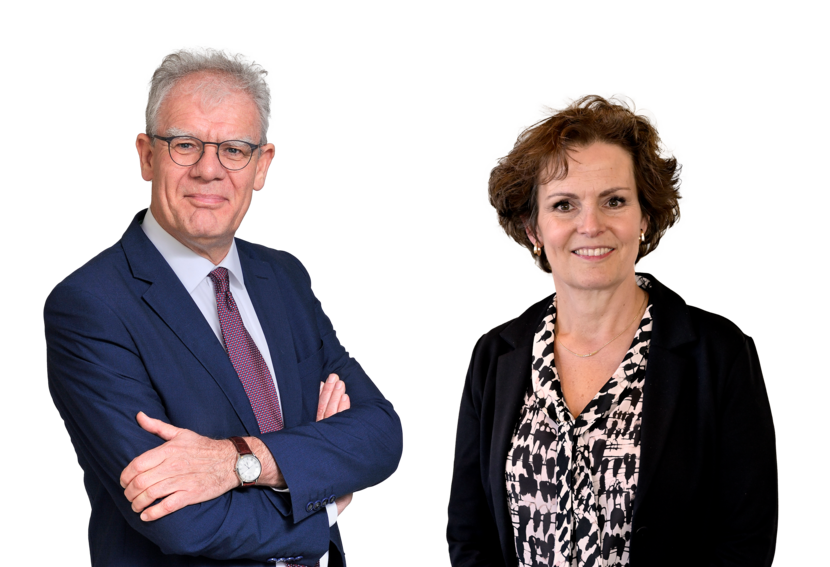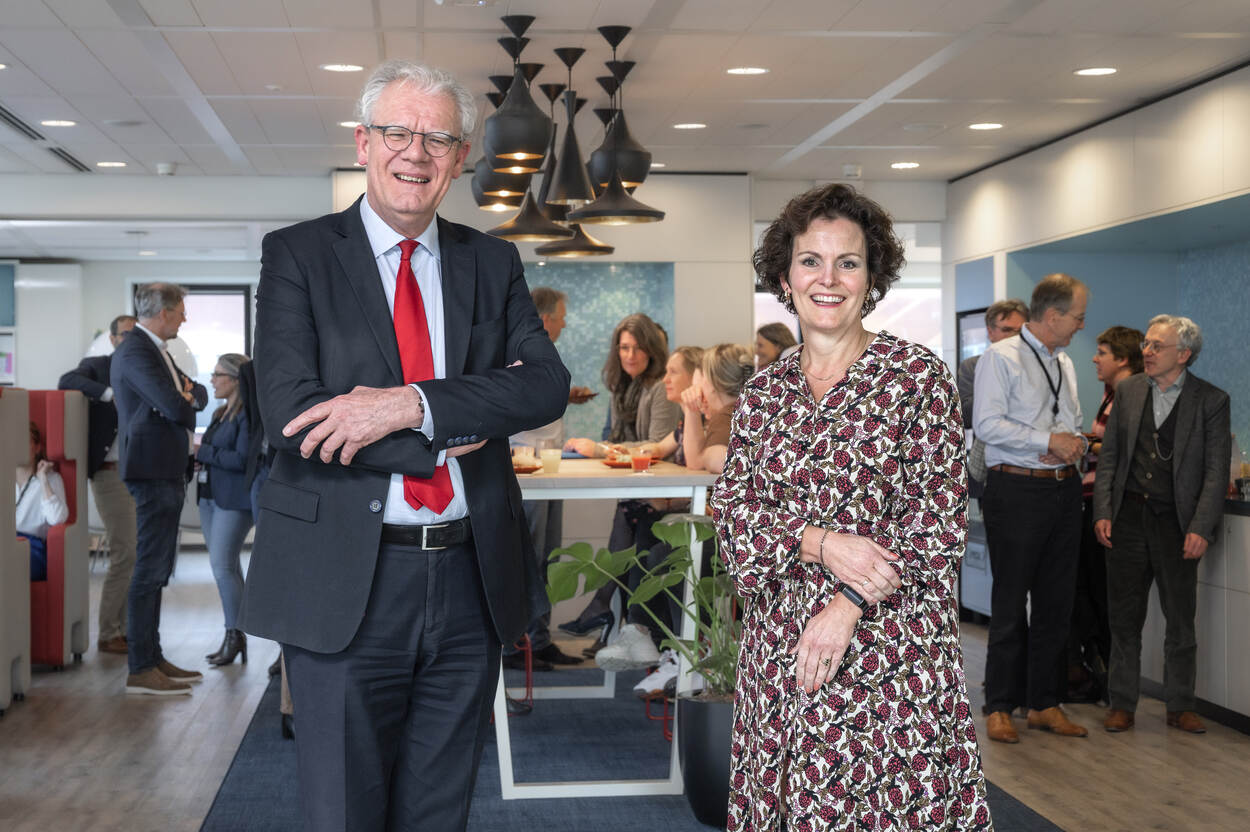2022 was the year when the Covid pandemic petered out. But COVID-19 still left its mark on our work. Our hard work on Covid vaccines and medicines continued on several fronts, even once these had been authorised. This report also covers a number of other topics. Chair Ton de Boer and Director Paula Loekemeijer look back on a dynamic year.
Looking for this year's annual report?
The 2023 Annual Report of the MEB can be found on our corporate website.
On the move
From pandemic to business as usual
Ton is grateful that as 2022 went on, COVID-19 gradually gave way to business as usual. “This allowed both the Agency and the Board to devote more time to ordinary dossiers. But even after the vaccines and medicines had been authorised, we still took a number of important steps related to the coronavirus. This included expanding the indications for the Covid vaccines to include young people, and approving boosters and adapted vaccines for the different Covid variants. I look back with pride on the work the Agency has done: the speed of assessments in rolling reviews, which contributed to the vaccines being made available so quickly.”
Connecting with the outside world
Paula notes that something that has really taken off in the post-pandemic period is strong cooperation with parties close to the MEB, allowing connections with the outside world to be reforged. “We are once again seeking to connect on topics other than COVID-19. In-person European committee meetings and management meetings have started up again. This is important, because there are topics that really must be tackled throughout the chain of parties involved in medicines. These include our fellow agencies, experts in Europe, and the Ministry of Health, Welfare and Sport of course, but also parties such as the Royal Dutch Society for the Advancement of Pharmacy (KNMP), the Netherlands Pharmacovigilance Centre (Lareb) and other stakeholders. We have been able to hold effective discussions with all the parties in our network.”
"We are once again seeking to connect on topics other than COVID-19."
MEB Day
In 2022, all of those stakeholders came together in person again for MEB Day. Over 450 guests gathered in Maarssen: doctors, pharmacists, academics, people from the pharmaceutical industry and government agencies, as well as MEB staff. There was a varied programme based around the theme ‘Medicines within reach’, featuring keynote speakers and interactive breakout sessions. Patients and patient representatives were also present. Ton says that patient involvement was an explicit focus for the day. “It was an important subject covered in a panel discussion with all stakeholders, with examples given of patient participation in many areas relating to medicines, and possible improvements.”
Shortages
“Medicine shortages are something people have been aware of for years, but they are now becoming increasingly visible to the general public”, says Paula. “We have seen an increase in the number of potential supply issues. These continued to have an impact in 2022, which is concerning. For most supply issues, substitute medicines are available in the Netherlands. Where this is not the case, we work with the Health and Youth Care Inspectorate (IGJ) and the companies concerned to find solutions, such as temporarily obtaining medicines from overseas. If that’s not possible, we sit down with care providers and work out how we can minimise the consequences for patients.”
“We’re increasingly seeing companies reporting possible supply issues with medicines for which there are only one or two alternatives”, says Ton. “This increase is concerning. Despite the fact that solutions are being found for many supply issues, we’re also seeing pharmacists, doctors and patients being affected by genuine shortages.”
“Medicine shortages are something people have been aware of for years, but they are now becoming increasingly visible to the general public.”
One thousand board meetings
A nice prelude to MEB’s sixtieth birthday in 2023 occurred in March 2022: the Board met for the 1000th time since the agency’s creation in 1963. “It was a special moment”, says Ton. “During meetings – which are held twice a month – we discuss and assess dossiers relating to medicines and vaccines. After approval, medicines are given a registration number: the RVG number. That started in 1963 with tiger balm, which was registered as ‘RVG 00001’. Since then, we’ve registered tens of thousands of medicines.”
As Paula explains, the roles of the Board and the Agency have changed over the years. “Our tasks have changed over time, due in part to the arrival of European regulations and the European Medicines Agency. The Board plays an advisory role in European centralised procedures, with experts from the Agency presenting the Netherlands’ position. Their role has become more important in recent years as the number of European centralised procedures has increased enormously.”
"It started in 1963 with tiger balm, which was registered as ‘RVG 00001’. Since then, we’ve registered tens of thousands of medicines.”
Ton agrees. “What’s more, the work we do ourselves is also changing. For example, we’re witnessing the emergence of personalised medicines and cell therapies. Such medicines are methodologically challenging. There’s less likely to be trials involving large patient groups. How do we deal with that? That’s something that needs to be looked into at a European level, and also by our European representatives in the Agency.”
Changes in the Agency
Paula explains that a lot happened within the Agency in 2022. “In 2022, we set a number of priorities. We want to focus more on our core tasks, be more in control and continue to work on our professionalism. As a result, we’ve made a start on changing and modernising the system we use to process all dossiers. This work should be completed within the next few years.”
The organisational structure of the Agency has also been modified. “We’re now working with a divisional structure, with tasks, roles and responsibilities being structured slightly differently. This should also make it clearer to the outside world who our stakeholders should approach with which questions. For example, there is now a division responsible for those European tasks I mentioned earlier.”
Annual financial statements
The MEB posted a positive result of €0.1 million in 2022. The revenue from procedures and annual fees was €1.3 million higher than budgeted in 2022. “The main reason for that is the influx of procedures submitted via the European Medicines Agency (EMA), which has returned to its usual high level,” explains Paula. “This income increased to €2.1 million higher than budgeted. Meanwhile, the revenue from other procedures was lower than budgeted.”
More details about the results can be found in the annual financial statements.









